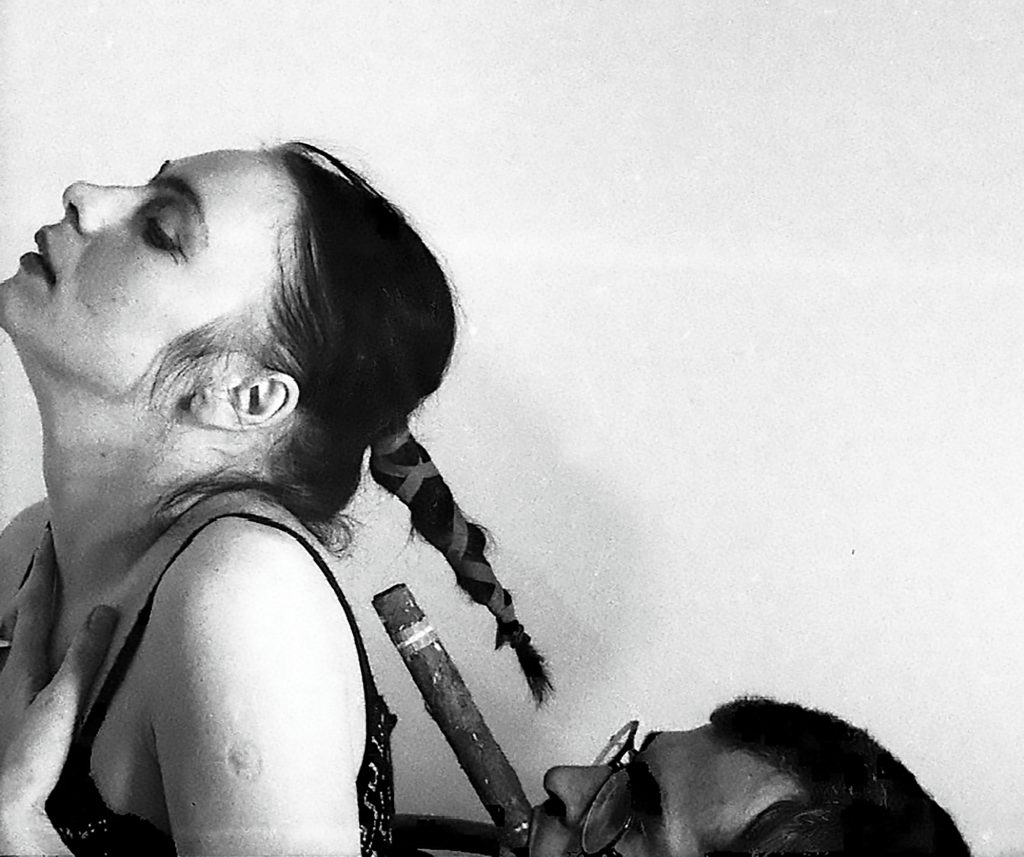
On the Other Side
Teresa Tyszkiewicz and Zdzisław Sosnowski
Opening: Friday, 17.12.2021, 6–9 pm
18.12.21–12.02.2022
Tuesday–Saturday, 12.00–19.00
The joint projects by Teresa Tyszkiewicz and Zdzisław Sosnowski introduce viewers to the sensual world of relations between a man and a woman. Their films form emotional narratives about being together, about what happened between them and yet seemed impossible to rationalise. In the individual images and sequences, they looked for “visual equivalents” of the experiences they were having. Changing shots and close-ups create scenarios based on feelings and erotic tension. In the actions whose matter consisted of their emotions and feelings, the artists controlled the camera that penetrated very intimate corners of their common life.
The project Permanent Position (1978–1979), comprising a film and several photographic series, shows sexuality open to various nuanced forms of female and male eroticism. Attractive bodies, sexuality and desire were a challenge to the prudish communist culture of the late 1970s. With a liberated look at their own erotic experiences, the artists broke the taboos of the time.
The boldness with which they revealed their own intimacy went hand in hand with a play on the perception of sexuality by the mass media of the time. Reaching for the props of erotic representations such as soft fur coats, shiny stilettos and sexy underwear, they placed fetishism beyond the dualistic division of the sexes. In the film The Other Side (1980), in scenes improvised for the camera, they showed the pressure of media stereotypes that shape sexual imagination.
The dramaturgy of the film version of the Permanent Positions is constructed from sequences interrupted by still photographic images on a stop-frame basis. The discontinuity of the recording is emphasised by the fading sound of the film tape perforation. The changing tempo and rhythm of the sound dynamises the web of tensions built up by subsequent mini stories.
Most of the frames are dominated by the figure of Teresa Tyszkiewicz, who was at the time entering the scene of the artistic avant-garde. In their joint films and photographic series, the artist, who lets her emotions guide her, and Zdzisław Sosnowski, who has a background in the media, created an artistically radical, sensual record of their relationship.
Teresa Tyszkiewicz and Zdzisław Sosnowski were married in 1977 and lived in Paris from 1982.
Teresa Tyszkiewicz (1953–2020) worked in performance, photography, painting and drawing, and created spatial objects and sculptures. She debuted in the late 1970s and early 1980s as an experimental filmmaker. She made her first films and photographs together with Zdzisław Sosnowski. Her individual film productions from the early 1980s are now counted among the iconic works of feminist art. She is known as the author of monumental paintings usually made with pins. By sticking them into canvasses, paper, photographs, sheet metal, and various objects, the artist developed her own, very individual style and something that few artists have – the almost immediate recognisability of her works.
Zdzisław Sosnowski (1947), author of films and photographs, performer, painter, creator of experimental sound works and computer-generated art. One of the leading figures of the Polish neo-avant-garde of the 1970s, an active animator of artistic activities and curator of numerous exhibitions, member of the Current Art Gallery group in the first half of the 1970s, associated with the PERMAFO Gallery in Wrocław, in Warsaw he ran the Contemporary Gallery (1975–1977) and then the Studio Gallery (1978–1981), and the Galerie Ghislave in Paris (1991–1992). In the mid-1970s, he initiated the film and photographic project Goalkeeper, in which he played the role of a football star in a pop-cultural style of media spectacularisation, embodying the ambiguous hero of communist consumerism.
